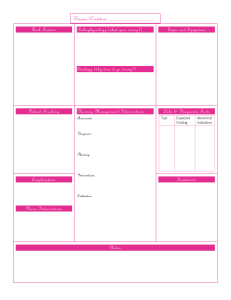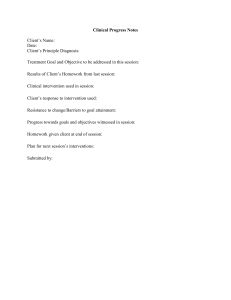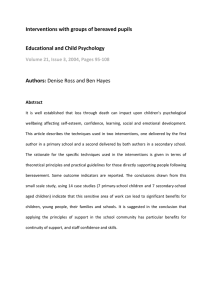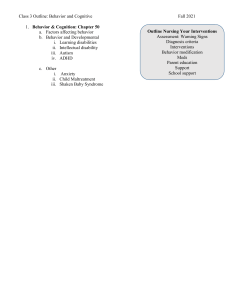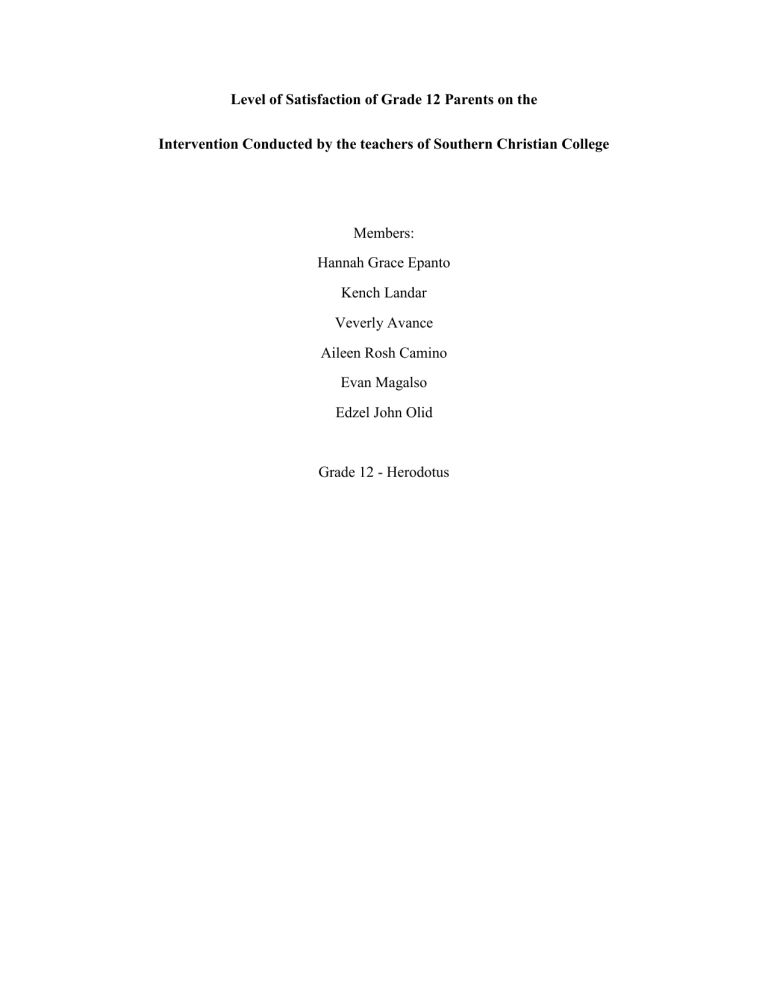
Level of Satisfaction of Grade 12 Parents on the Intervention Conducted by the teachers of Southern Christian College Members: Hannah Grace Epanto Kench Landar Veverly Avance Aileen Rosh Camino Evan Magalso Edzel John Olid Grade 12 - Herodotus CHAPTER 1 Introduction In the year 2019-2020, the virus Covid-19 has been spread out in the whole world which cause chaos and fear in the life of so many people. One of the affected by this global crisis was the education. School closures have unprecedentedly altered the daily lives of the student learners, their families,and their educators. Incredibly, more than half a billion children (Cohen & Kupferschmidt, 2020) have been forced to become virtual-school learners as they shelter in their homes, while parents, siblings, and other family members have taken on the new role of learning facilitators, teachers, and coaches. Despite the overwhelming experience of the pandemic, the Philippines had adjusted and decided to conduct the new normal education through online and modular learning to secure the health and safety of the students, teachers, and other workers. The new normal education is the technological order or a passive technologization and its expansion continues uncontested and even accelerated by the pandemic (SpringerLink, 2021). Many teachers, parents and also students have been unprepared for this sudden shift, from traditional mode of teaching to online and modular learning, leading to hardships and issues of the students that is new to the online and modular learning, unlike traditional learning that have been the number 1 mode of learning for ages in our country. Online learning or the new mode of learning in the Philippines, have caused issues and hardship for the students as they were just adjusting to the mode of learning, these have caused to parental involvement to immerge. Parental involvement is an important factor for student achievement in traditional school settings. Parent support has demonstrated significant contributions to the success of learners in a virtual learning environment (Borup et al., 2014; Feng & Cavanaugh, 2011; Lee & Figueroa, 2012; Makrooni, 2019; Woofter, 2019). That is why it is important to evaluate the interventions of the teachers from their academic context and value in our new learning education. According to Lestrud (2013), Educational interventions provide students with the support needed to acquire the skills being taught by the educational system and should address functional skills, academic, cognitive, behavioral, and social skills that directly affect the child's ability to access an education. Furthermore, the involvement and awareness of the parents are important because it is their responsibility to monitor every detail of their children’s lives as it will help the student to encourage and to boost their confidence to achieve their goals and dreams. Amid this phenomenon, we conduct a study that focuses from the point of view of our dear parents to the performance of the teachers. Since the teaching method will be different from face-to-face classes, it is also important to evaluate the Interventions of the teachers from their academic context and value in our new learning education. According to Lestrud (2013), Educational interventions provide students with the support needed to acquire the skills being taught by the educational system and should address functional skills, academic, cognitive, behavioral, and social skills that directly affect the child's ability to access an education. Furthermore, the involvement and awareness of the parents are important because it is their responsibility to monitor every detail of their children’s lives as it will help the student to encourage and to boost their confidence to achieve their goals and dreams. We choose this topic to determine the level of satisfaction of the grade 12 parents with the intervention conducted by the teachers especially from Southern Christian College (SCC). Considering the effect of Covid-19 on our learning method and its institutions, we want to grab this opportunity; to focus more on parental satisfaction as this study also helps develop the relationship of students with their parents. As a researcher and a grade 12 student from Southern Christian College (SCC), this study is important for it will also determine as an evaluation for our loving teachers. In this study, we expect that the level of satisfaction impose by the teachers with the parents about their child's performance is very satisfactory since the intervention method will be suitable for society especially for the Grade 12 students of Southern Christian College (SCC). The different ways of intervention towards the students are effective and will help them to improve their skills and behavior in social and education. Lastly, the parents will participate in the teacher’s initiative about their children through media platforms such as zoom meetings, google meet up or via phone calls. Statement of the Problem This study aims to determine the level of satisfaction of grade 12 parents on intervention Conducted by the Teachers of Southern Christian College (SCC). Especially the study will seek answers to the following questions: 1. What is the level of Satisfaction impose by teachers on intervention with parents of the Grade 12 students? 2. What are the different ways of intervention of the teacher towards the student? 3. How do parents participate well in the teacher's initiative to reach out to them about their child's intervention? Significance of the Study The study will focus on Parental Satisfaction of Grade 12 students on Intervention Conducted by the teacher from Southern Christian College (SCC). Hence, the result of the study may be beneficial to the following: Curriculum Developers. The outcomes of this study help to create, improve the methods or discuss concept step by step process offered by a school and universities regarding this problem. To develop new ways of intervention that directly affect the student’s ability. Researchers. The result of this study provides guidelines and opportunities to develop the knowledge of the researchers. To create details or awareness of their study. Teachers. The outcome of the study may help to through conducting possible programs or training on what ways or what technic should be used by the teachers to boost their perception and job satisfaction which leads also lead to achieving high productivity of the students Parents. The outcome of this study will help the parents to easily guide their children during this challenging pandemic because the intervention conducted by the teachers will also effectively work to develop the relationship with their children. Students. Through conducting this research, students may improve their skills in functional, academic, cognitive, behavioral, and social since and strengthen their relationship with their parents and teacher. Scope and Limitation of the Study This study is limited only to the parents of a student of Grade 12 the year 2021-2022 of Southern Christian College It will be conducted in the month of September with parents whose son/daughter are students of Southern Christian College (SCC). Definition of Terms Intervention. A process of intervening with the outcome especially with a condition or process in preventing harm or improve functioning. Interventions help the teachers identify the early signs of learning disabilities, but that is not their only or primary use. Today, instructional and behavioral interventions are used to identify and remove obstacles that hinder a student’s academic progress. In general terms, intervention in education is a set of steps a teacher takes to help a child improve in their area of need by removing educational barriers (Lynch, 2019). Parental Satisfaction. It refers to the extent to which parents are satisfied with their children in relation to parent and child interactions. This will determine the activities, punishment, and behavior of the student that will give satisfaction and improve their relationship with their parents (Bradshaw, 2014). CHAPTER 2 REVIEW OF RELATED LITERATURE This chapter contains reviews of Literature and studies on the personality types of Technological knowledge Management system, adding its possible effect on the following interventions. The Related studies, Conceptual Framework, and definition of terms are also presented in this section. According to this study, the purpose of this study is to investigate the types of knowledge about intervention processes that can be generated by quantitative and qualitative data and discuss how these sources can be optimally applied to mixed method design. That is. Therefore, it is not a different form of study of the mixing method. (Nastasi et al., 2007; Teddlie and Tashakkori, 2009; Creswell and Plano Clark, 2011). But instead, an assessment of the characteristics and potential role of a particular data source in a mixed method that assesses tissue intervention. Sequential analysis of mixed methods is used to identify a set of factors in quantitative data that act as an analytical framework for measuring qualitative data. This approach helps to emphasize knowledge about the interventions that each data collection method can provide and to allow discussion of differences and similarities. A common method of quantifying awareness of an intervention process is the development and use of a process evaluation scale (Havermans et al., 2016). For example, while there are general measures for measuring management behavior and leadership (Carless et al., 2000), the quantitative process assessment approach is for measuring management attitudes and behaviors that are directly related to the intervention in question. Focuses on the development of scales. Established interventions include intervention process measures (IPM; Randall et al., 2009) and inventory of health change processes (Tvedt et al., 2009). Other approaches include employee participation in the activity (Füllemann et al., 2015), recognition of the legitimacy of the change program (Biron et al., 2010), stakeholders (Sørensen and Holman, 2014) or implementation. Degree (Eklöf and Hagberg, 2006; Hasson et al., 2014). A review of the process variables used to assess tissue stress management interventions has shown that there is significant heterogeneity in measurement levels and assessed components (Havermans et al., 2016). The use of process evaluation, defined as the evaluation of “individual, collective or management perceptions and actions in implementing any intervention and their influence on the overall result of the intervention.” Nytrø et al. (2000) has served to increase focus on the evaluation of the specific In educational settings, intervention are often used to describe a focused teaching session, which is deviation away from existing teaching practice. Interventions in schools can be one-to-one, or delivered as group. The aims of the program will have been carefully created by a teacher or teaching assistant based on a key area of need. Interventions should be delivered alongside quality first teaching, and are often used to support students with send. Many issues students face in their learning are interconnected. It might be that a student is displaying concerning behavior, and is falling behind academically, so each intervention needs to address each individual’s specific areas of need. As a result, some interventions are targeted, and are put in place to address certain weakness. These interventions are likely be more formally monitored in order to track the student’s progress, whereas other interventions are more flexible, and adjust according to the changing needs of the student (Hawthrone,2021) In addition, Children, Violence and trauma intervention, We have seen so many children coming to school or even in this new learning system who’s experiencing violence issue. These are the violence they may experience or experiencing, Bullying, Harassment, Domestic violence, Neglect, abuse, and worst is suicide. If students live in chaotic environment at home any times the school is the only safe place same place where they feel like their well being is regarded (Hertel, 2015).Children who deal with traumatic issue their mind is not on the school work. Teachers may have this school friendly activity and ask students situation physically, mentally, emotionally and spiritually by messaging , calling, or conduct online interview for students. Children can experience a wide range of traumatic events regardless of whether a children lives in an urban are or rural area (Wong,2015). Each of us know that there is a link between academic engagement and school engagement in traumatic stress and violence, some of the symptoms that children presents within this new learning like re-experiencing, avoidance and absence. Those things are showed up as problematic behaviors school setting (Dietra,2019). Schools can provide the perfect setting to promote resilience and lessen the effect of adversity but fro some children experiences in school caused a whole other set of another emotional challenges. Traumatized children can have difficulty regulating emotion, staying on task, and relating with others which can prompt bullying from fierce and harsh discipline from teachers (School of social work 2019) Student learning interventions are a group of steps and plans for the students succeed in their academics. The intervention also brings success in the family, a greater understanding of their child’s needs, and how to break learning down into small steps for their child. (Wetherby A.) For this reason, we can say that interventions are invaluable for the students who have academic and personal problems to determine their qualities, potential, and classifications. In the daily life of a student, intervention can be accessible in achieving dreams. It is a process where they can develop and establish their potential and overcome barriers in their education. According to the study of Mayer G.R & Sulzer B, some treasured interventions for the students include building relationships, adapting to the environment, managing sensory stimulations, and developing social skills. In environmental awareness, many organizations, schools, and other groups in the society conduct programs, seminars, and curriculums to spread interventions regarding a specific issue. This awareness must help prevent negative behaviors of the student and focus their attention in a learning environment. In spreading awareness, we must set our objectives. The goal must address prevent negative behaviors, not to punish the child. The hope is to put the child back on track to a brighter, more prosperous future. (Blanks, 2020) Although students and the situation in our environment can change instantly, we must adjust and know the causes of their negative behavior, Says Blanks (2020), the school may not have all the information about what is causing to act out, but the parent and the children sometimes hide the sensitive information that could bring attention. So, it is essential to understand the root of the behavior. Because of this, we can develop our knowledge about interventions and spread awareness easily. Conceptual Framework Figure 1 presents the paradigm of the stud. Effectiveness of the teachers Intervention is the Independent Variable while the Satisfaction of Parents Is the Dependent Variable. The effectiveness of Teachers intervention may help to satisfy the parents and help the students. Effectiveness Satisfaction of Of the teachers Parents Intervention Figure 1. Schematic diagram showing the Independent and Dependent Variable of the study. Definition of Terms The following terms are further defined either operationally or conceptually. Intervention. The action or process of intervening or evaluation. Online Learning. A type of the learning that takes place over the internet, it is also at type of distance learning. Student Learning Intervention. The interventions that uses a specific program or set of steps to target an academic need. Traditional Learning. A type of learning that takes place in a classroom setting. References: https://www.ajqr.org/article/parents-experiences-with-remote-education-during-covid-19school-closures-8471 https://www.ajqr.org/article/parents-experiences-with-remote-education-during-covid-19school-closures-8471 https://www.ajqr.org/article/parents-experiences-with-remote-education-during-covid-19school-closures-8471 https://www.ajqr.org/article/parents-experiences-with-remote-education-during-covid-19school-closures-8471 https://www.ajqr.org/article/parents-experiences-with-remote-education-during-covid-19school-closures-8471 https://www.edu.gov.mb.ca https://www.readingrockets.org.?article?importance-early-intervention https://insightstobehaviore.com/blog/create-effective-behavior-intervention-plan/ https://ovc.oip.gov/sites/g/files/pubs/throughOureyes/schoolintervention.html
